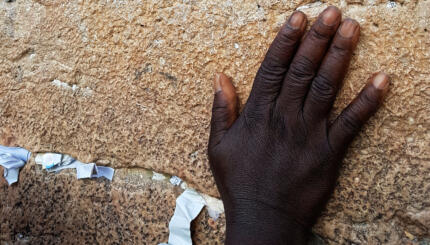The following article is reprinted with permission from The Forward.
A new president of the Hebrew Union College‑Jewish Institute of Religion was inaugurated in a moving ceremony held October 13 [2002] in the ornate Plum Street Temple in downtown Cincinnati. Rabbi David Ellenson, a native of Newport News, Va., and a long‑time resident of Los Angeles, spoke from the pulpit of this classic Moorish‑style temple about the unique challenges of leading an American rabbinical seminary into the 21st century.
On one level, Ellenson seems to be an odd choice to lead the Reform rabbinical seminary. He is more a scholar than an administrator or fundraiser, more a teacher than a pulpit rabbi. But even more significantly, Ellenson defies denominational classification: born and raised in an Orthodox home, he has written extensively on Modern Orthodoxy, with particular interest in the role of [Jewish legal] responsa in shaping its contours. Along with his wife Jackie, who is also a rabbi, he spent many years in Los Angeles as a pillar of the Library Minyan of Conservative Temple Beth Am. And for nearly three decades of his life, he has been a professor at the Reform HUC.
The audience assembled at the Plum Street Temple was unperturbed by Ellenson’s denominational eclecticism. Rather, they took ample note of the new president’s erudition, as well as his legendary kindness and compassion. A smaller number of cognoscenti also marveled at the historical journey of the Reform movement in the United States.

Help us keep Jewish knowledge accessible to millions of people around the world.
Your donation to My Jewish Learning fuels endless journeys of Jewish discovery. With your help, My Jewish Learning can continue to provide nonstop opportunities for learning, connection and growth.
To illustrate the point, a brief digression to culinary history is in order. In 1883, the first class of rabbinical ordinees was graduated from the HUC. The festive ceremony that marked the occasion, the first ordination of any rabbinical seminary in the United States, was held in the same Plum Street, or Bene Yeshurun, Temple.
Following the ceremony, a gala dinner was held that drew representatives from more than 100 synagogues across the country, members of the eight‑year old Union of American Hebrew Congregations.
The founder of the union and president of its Hebrew Union College, RabbiIsaac Mayer Wise, had hoped to forge a broad congregational association that would unite all of American Judaism under one roof, and indeed, more than half of the nation’s 200‑odd synagogues were on board.
That dream ended with dinner. The meal commenced with half‑shell clams, proceeded to soft‑shell crabs andshrimp salad, as well as a number of meats, before concluding with ice cream dessert. Unprepared for such an “innovative menu,” the more traditional abruptly fled from what has come to be known as the “Treifa [non-kosher] Banquet.” The unintended legacy was the hardening of ideological divisions into denominational wings as we know them.
Nearly 120 years later, the invited guests of Ellenson’s inauguration party were treated to a thoroughly kosher dinner under strict rabbinical supervision. These two meals–the Treifa and the Kosher Banquets–stand as intriguing markers of the significant shifts that Reform, and American, Judaism have undergone.
Before the Treifa Banquet, the denominational boundaries of an emerging American Jewry were hardly visible. During the next century, these boundaries became reinforced as the four main denominations each built seminaries, synagogues, congregational organizations, youth movements and schools to embody their respective messages.
But today these borders seem to be eroding. Ellenson symbolizes that erosion in his own varied Jewish biography. So too does the fact that his institution recently awarded honorary doctorates to Rabbi Ismar Schorsh, chancellor of the Conservative Jewish Theological Seminary, and Rabbi Emanuel Rackman, former chancellor of the Orthodox‑ sponsored Bar‑Ilan University. For many decades, it would have been unimaginable that an Orthodox rabbi like Rackman would have accepted a doctorate from HUC. But having reached more than four score and 10 years, Rackman is so distinguished, wise and courageous as to deliberately and openly rise above denominational differences.
His example suggests that there may well be more that unites than separates the various constituents of American Judaism. This is particularly true when we observe that American Jewry may be shrinking at a marked clip, at least according to the recent National Jewish Population Survey. This is also true when we notice the growing trend toward increased observance in all of the denominations, including the Reform movement. The Kosher Banquet of 2002 is but one link in a chain of growing traditionalism that defines American Jewish religious identity in the new century.
For some, this development is cause for joy. And yet we must also recall that drift and alienation from organized Jewish life continue, in part because denominational packaging no longer appeals to a growing number of hungry spiritual consumers.
The intriguing transformations of the Reform movement, as symbolized by the presidency of Ellenson, should prompt a probing debate about the role and relevance of denominations in American Judaism of the 21st century. So too should the current struggles to chart a coherent course for American Orthodoxy–as reflected in the difficulty in finding a successor to Yeshiva University’s long‑time president, Rabbi Norman Lamm, who has skillfully mediated the demands of being college president and rosh yeshiva.
In fact, all the American Jewish denominations must now ask themselves whether their considerable, but ultimately limited, resources are better utilized in preserving their own institutions or joining forces to confront the challenging days ahead.


